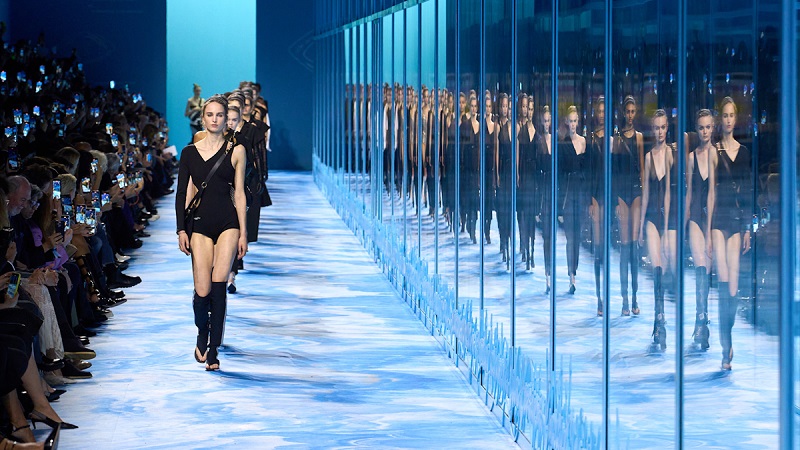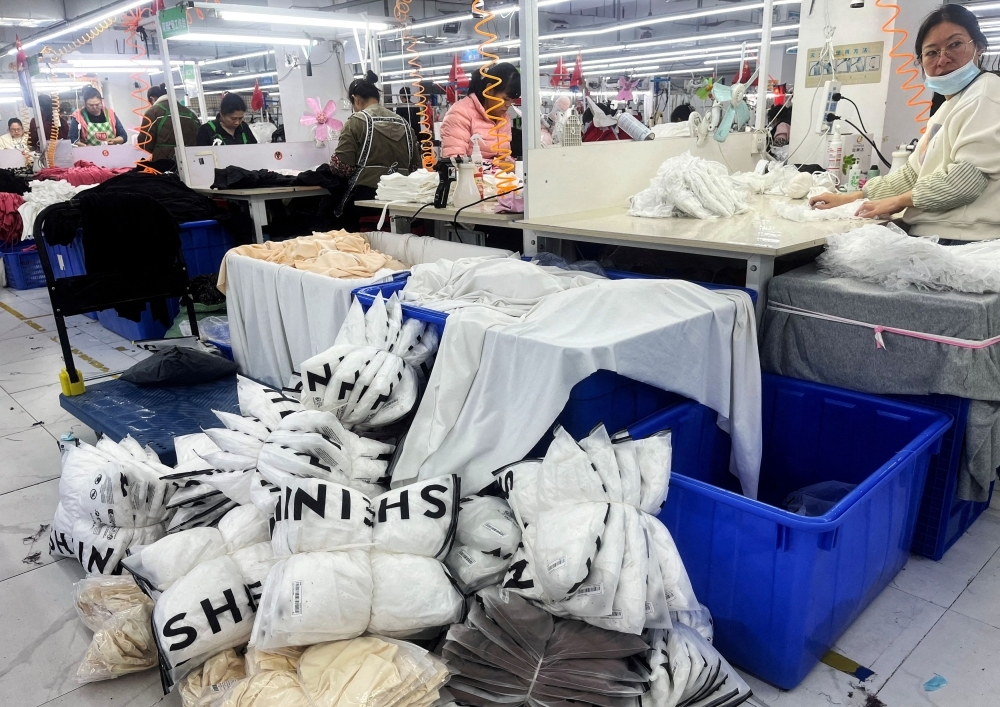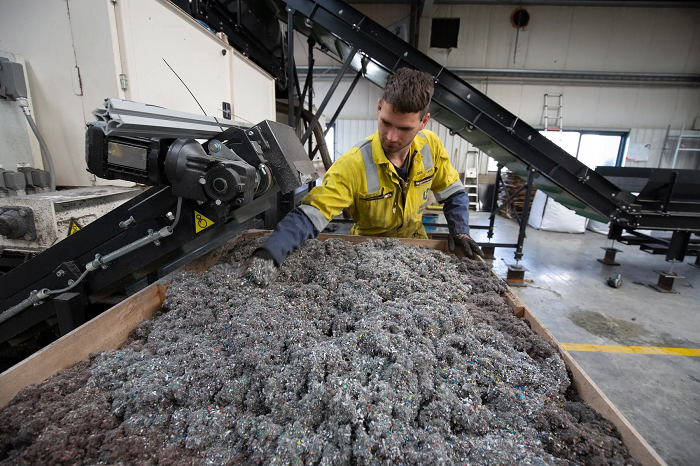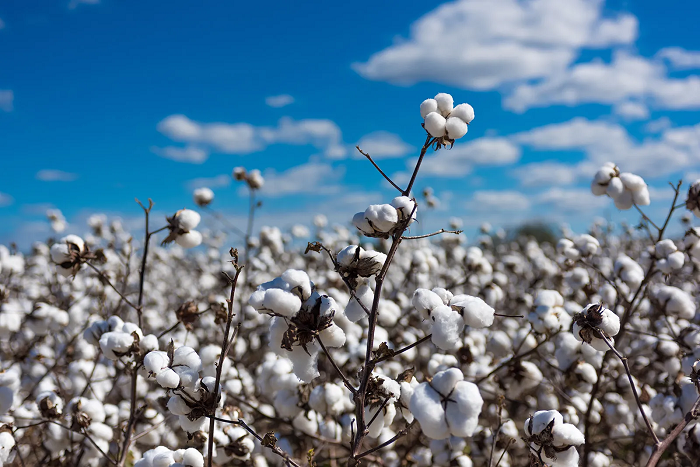FW
Lenzing will set up a new production facility in Thailand. Thai production volumes would be around 90,000 tons a year. Thailand is one of the few countries with free trade agreements in the Asean region as well as with China and India. This will enable Lenzing to supply to customers worldwide. Lenzing expects 2018 earnings to be lower than in the last two years, partly due to increased commodity prices and strong competition on the fiber market.
The company has halted a project in the US partly due to rising tariffs between the United States and China, where much of the project’s production was destined. Chinese textile exports to the United States now face a 10 per cent tariff, with the possibility tariffs might increase and China would respond with counter-duties. Lenzing’s assessment is that products such as its Lyocell fiber may be affected.
Lyocell, a fiber produced from wood, is one of the group’s top-sellers. Lenzing remains on track for specialty expansions such as Tencel Luxe filaments and Lenzing Ecovero viscose fibers. No substantial additional lyocell volumes, over and above the successful 25.000 tons expansion in Austria, will be added to the market in 2019 and 2020 by Lenzing.
"As per State of Fashion report 2018 released by McKinsey & Company, the ecological impact and the carbon footprint of the fast fashion industry, remains a cause of concern even though the industry has become more environmentally responsible and sustainable. The journal Natural Climate Change reveals the current total greenhouse gas emissions from textile production stand at 1.2 billion ton annually. The fashion industry is responsible for 10 per cent of the global carbon emissions and, according to UNFCCC, if the sector fails to adopt sustainable initiatives its emissions are likely to rise by more than 60 per cent by 2030."
 As per State of Fashion report 2018 released by McKinsey & Company, the ecological impact and the carbon footprint of the fast fashion industry, remains a cause of concern even though the industry has become more environmentally responsible and sustainable.
As per State of Fashion report 2018 released by McKinsey & Company, the ecological impact and the carbon footprint of the fast fashion industry, remains a cause of concern even though the industry has become more environmentally responsible and sustainable.
Increase in textile emissions
The journal Natural Climate Change reveals the current total greenhouse gas emissions from textile production stand at 1.2 billion ton annually. The fashion industry is responsible for 10 per cent of the global carbon emissions and, according to UNFCCC, if the sector fails to adopt sustainable initiatives its emissions are likely to rise by more than 60 per cent by 2030.
As far as carbon footprints are concerned, manufacturing hubs China and India are the two major culprits. More than 60 per cent of textiles are used in the garment industry and a large proportion of clothes are manufactured in China and India, countries which rely on coal-fuelled power plants, increasing the footprint of each garment.
Use of sustainable materials
The production of polyester and cotton, two most commonly used fabrics in the industry, has a considerable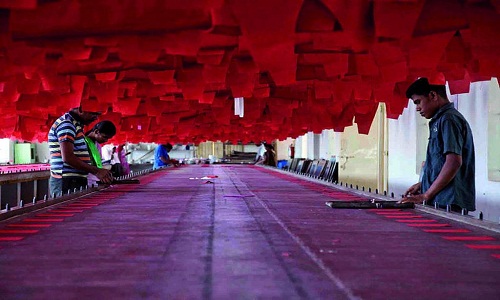 impact on the environment. The production of polyester results in more emissions since the material is produced from fossil fuels such as crude oil. As per estimates, 262 per cent more CO2 is emitted to produce a single polyester T-shirt than a cotton shirt. Therefore, as the Pulse of the Fashion Report 2018 suggests substituting polyester with its recyclable counterpart is advisable. This not only reduces the toxic substances by 90 per cent reduction, but also energy usage by 60 per cent and emissions by 40 per cent.
impact on the environment. The production of polyester results in more emissions since the material is produced from fossil fuels such as crude oil. As per estimates, 262 per cent more CO2 is emitted to produce a single polyester T-shirt than a cotton shirt. Therefore, as the Pulse of the Fashion Report 2018 suggests substituting polyester with its recyclable counterpart is advisable. This not only reduces the toxic substances by 90 per cent reduction, but also energy usage by 60 per cent and emissions by 40 per cent.
Garment longevity and carbon emissions
The average number of times a garment is worn before being discarded is 36 per cent compared to 15 years ago. After use, less than 1 per cent of the material used to produce clothing is recycled into new clothing. An estimated $500 billion worth is lost every year due to this take-make-dispose model. If nothing changes, by 2050, the fashion industry could use more than 26 per cent of carbon budget associated with a 2C pathway, warns Ellen MacArthur Foundation.
But, it is possible to reduce the industry’s GHG emissions, says Ellen MacArthur Foundation. The foundation advises doubling the number of times a garment is worn. This would reduce GHG emissions by 44 per cent. Using low-carbon materials and production processes (including renewable energy and energy-efficiency measures) would further reduce the GHG emissions of a new system.
The next fashion trend
Recently 10 UN nations came together to establish the UN Alliance on Sustainable Fashion which will launched in March 2019. This alliance will target the private sector, governments of UN member states, NGOs and other relevant stakeholders to make sustainability the next fashion trend.
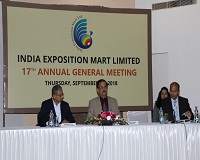 Rakesh Kumar, Chairman, India Exposition Mart Ltd(IEML), while addressing its 17th AGM in New Delhi informed that the organisation has crossed Rs 100 crore turnover for the financial year 2017-18. He also mentioned about various services added in the mart area and many more being planned. The organization will soon be connected to the metro and Jewar airport. This will provide relief to mart owner and commuters visiting expo mart and trade fairs at the venue. The company has installed 3MW solar roof top making exp mart as the first with the highest installed solar power amongst the various exhibition venues.
Rakesh Kumar, Chairman, India Exposition Mart Ltd(IEML), while addressing its 17th AGM in New Delhi informed that the organisation has crossed Rs 100 crore turnover for the financial year 2017-18. He also mentioned about various services added in the mart area and many more being planned. The organization will soon be connected to the metro and Jewar airport. This will provide relief to mart owner and commuters visiting expo mart and trade fairs at the venue. The company has installed 3MW solar roof top making exp mart as the first with the highest installed solar power amongst the various exhibition venues.
Shareholders present in the meeting appreciated the efforts made by IEML team. The company has reappointed and elected directors on its board namely, Babu Lal Dosi, Satish Dhir, Tafsir Ahmad, Vivek Vikas and Sudhir Tyagi, RK Malhotra and RK Passi as Independent Directors
Some of the world renowned fair and events held at expo mart include the 14th edition of Auto Expo,44th & 45th IHGF Delhi Fair,13th ELECRAMA, 3rd edition of Global Exhibition on Services-GES 2017,200th India International Mega Trade Fair(IIMTF), Indus Food Exhibition-2018(RBSM), 2nd Exhibition Excellence Awards -2017, the 19th Organic World Congress and 18th World Road IRF Meeting 2017.
Khurram Mukhtar has been elected chairman, Pakistan Textile Exporters Association (PTEA). He hails from a prominent business family active in exports, business and industry. He has 25 years of experience as a professional management executive. He has served on the boards of many charitable, health and educational institutions. He is the director of the Faisalabad Garment City Company, a member of the core committee of Young Entrepreneur Organization of Pakistan and a member of the International Textile Manufacturers Federation, Switzerland. He has also an excellent trade record of serving in social sector.
He feels Pakistan’s textile sector has the potential to wipe out the entire trade deficit, provided factors impeding its growth are removed. Mukhtar has been elected PTEA chairman for the second time. Twelve members were elected for the executive committee seats for the next two years.
PTEA is Pakistan’s apex textile body. Pakistan’s textile exports fell 0.49 per cent in July 2018 compared to the same month a year before. Textile exports make up around 60 per cent of the country’s total exports. The textile sector has the largest share in Pakistan’s exports.
The American Apparel and Footwear Association (AAFA), in association with AmCham Vietnam, will conduct the AAFA Product Safety and Compliance Conference in Vietnam next month. The conference will be held at the Reverie Saigon in HCM City on October 18.
Through this conference, AAFA will bring together industry leaders to educate factories and suppliers in Vietnam on the critical components of manufacturing and delivering products that meet global regulations and industry compliance. The day-long event will include seminars on topics like product safety, compliance, understanding of regulations, corporate social responsibility, forced labour, workers’ safety, consumer demands on sustainability, trade relations, among others.
This initiative holds relevance, considering that Vietnam is one of the biggest garment hubs in Southeast Asia and, therefore, a good understanding of safety and compliance standards is a pre-requisite for every garment company in the country. For over two decades, AAFA, the political voice of the apparel and footwear industry, has been providing expertise in supply chain management, trade policy and brand protection. AmCham Vietnam too has been consistently promoting trade and investment between the United States and Vietnam.
No substantial additional lyocell volumes, over and above the successful 25,000 tons expansion in Austria, will be added to the market in 2019 and 2020 by Lenzing. Among the reasons are: rising likelihood of increased trade tariffs, paired with the potential surge in construction costs due to the buoyant US labor market.
Consequently Lenzing will put all its efforts into readjusting the execution of its growth plan to meet the strong market demand for its lyocell fibers. This includes an increased focus on the lyocell expansion project in Thailand. Lenzing remains on track for specialty expansions such as Tencel Luxe filaments and Lenzing Ecovero viscose fibers.
With Tencel Luxe, a lyocell filament, Lenzing entered the filament market for the first time. It will further support Lenzing’s shift to become a true specialty player in the botanic materials market derived from sustainable wood sources. Tencel Luxe will open new markets for Lenzing and allow the company to participate in the premium segment of the fabrics market.
The eco-botanic lyocell filaments are made from wood pulp, which is sourced from sustainable wood in line with Lenzing’s strict wood and pulp policy.
Kering has been listed on the Euro Stoxx 50® index, one of the major indexes of listed shares of the Euro area. The Euro Stoxx 50® comprises the 50 largest listed stocks in the Euro zone, in terms of free-float market capitalisation.
A global Luxury group, Kering manages the development of a series of renowned maisons in Fashion, leather goods, jewelry and watches: Gucci, Saint Laurent, Bottega Veneta, Balenciaga, Alexander McQueen, Brioni, Boucheron, Pomellato, Dodo, Qeelin, Ulysse Nardin, Girard-Perregaux, as well as Kering Eyewear. The group founded in 1963 is now one of the fifty largest market capitalisations in the eurozone. The group’s shares have been listed on the Euronext Paris since 1988 and have been part of the CAC 40 index since 1995.
Andrea Pesaresi has been appointed as the President of Michael Kors Men’s. He will report to John Idol, the company’s Chairman and Chief Executive Officer. Pesaresi was most recently employed with at Philippe Model, where he served as the CEO. Prior to that, he was employed with Ermenegildo Zegna for 25 years, where his role was that of the brand director of Z Zegna and Licensing which encompassed product development, brand strategy, international expansion, and marketing.
Michael Kors is a global fashion luxury group from UK, consisting of iconic brands that are industry leaders in design, style, and craftsmanship. The appointment of Andrea as its president will provide the necessary leadership to enable it to achieve its goal of developing the menswear business to $1 billion in revenue.
Coats, the world’s leading industrial thread manufacturer, has expanded its global operations with the opening of a new development centre in Vietnam. This additional capacity makes the Hung Yen site one of Coats’ largest manufacturing units. It will increase the dyeing and finishing operations of the company by over 40 per cent and also provide additional warehouse space. The site, which is already a leader in many of the internal manufacturing performance metrics of Coats, demonstrates the company’s recognition of the growing customer base in the north of Vietnam.
The opening of the new building comes shortly after the announcement of Coats being named one of the best companies to work for in Vietnam by HR Asia, the leading regional HR publication. Coats first opened a site in Hanoi in 1992 and relocated to the current Hung Yen location in 2006. It also has a manufacturing facility in Ho Chi Minh City.
President Donald Trump has appointed Don Bockoven, Vice Chairman, National Council of Textile Organisations (NCTO) to the Advisory Committee for Trade Policy and Negotiations (ACTPN) for a four-year term. Bockoven is the President & CEO of Leigh Fibers and ICE Recycling, companies based in Wellford and Lake City, S.C., respectively.
The ACTPN is appointed by the President of the United States and provides overall policy advice on trade matters to the Office of the US Trade Representative (USTR). Established by Congress under the Trade Act of 1974, the committee provides information and advice with respect to US negotiating objectives and bargaining positions before entering into trade agreements, on the operation of any trade agreement once entered into, and on other matters arising in connection with US trade policy. The ACTPN considers trade policy issues in the context of the overall national interest.


